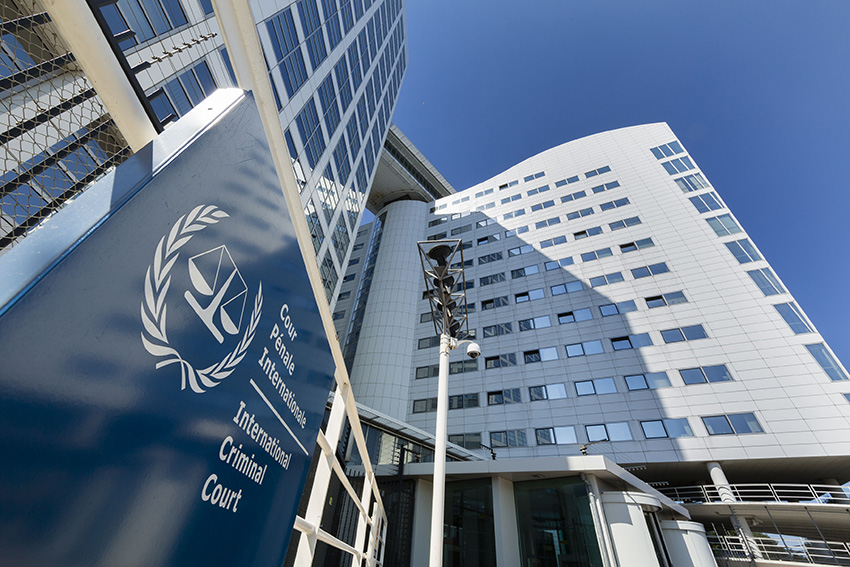More than 280 persons attended the event, including protagonists of the Rome Statute’s adoption, ICC officials, representatives of states, regional and international organizations, and civil society.
 THE HAGUE, Netherlands, February 16, 2018/ — On 15 February 2018, the International Criminal Court (ICC) (www.ICC-CPI.int) hosted the launch of the Coalition for the ICC’s (www.CoalitionForTheICC.org) commemorations of the 20th anniversary of the Rome Statute (https://goo.gl/TkmP61) – the Court’s founding treaty– with an Open Forum at the seat of the Court in The Hague, The Netherlands. [ads1]More than 280 persons attended the event, including protagonists of the Rome Statute’s adoption, ICC officials, representatives of states, regional and international organizations, and civil society.
THE HAGUE, Netherlands, February 16, 2018/ — On 15 February 2018, the International Criminal Court (ICC) (www.ICC-CPI.int) hosted the launch of the Coalition for the ICC’s (www.CoalitionForTheICC.org) commemorations of the 20th anniversary of the Rome Statute (https://goo.gl/TkmP61) – the Court’s founding treaty– with an Open Forum at the seat of the Court in The Hague, The Netherlands. [ads1]More than 280 persons attended the event, including protagonists of the Rome Statute’s adoption, ICC officials, representatives of states, regional and international organizations, and civil society.
“It is a great pleasure for me to receive at the ICC so many of those very same people who worked so hard to make this Court possible, said the President of the International Criminal Court, Judge Silvia Fernández de Gurmendi, calling the adoption of the Rome Statute “one of the biggest achievements of recent decades to advance the rule of law, a ‘revolution’ according to some.”
“This event recognises the role of the variety of stakeholders involved in the adoption of the Rome Statute – states, regional and international organisations, and civil society, and aims to spur a global dialogue on advancing justice for atrocities,” said the Convenor of the Coalition for the ICC, William R. Pace. “We call on all actors in the international system, organizations and individuals to organize 20th anniversary events throughout 2018 to raise awareness of this historic treaty and organization and commit to taking strides towards universal ratification and cooperation with ICC decisions, such as arresting wanted persons. Let us eliminate war and impunity for mass violence and repression.”
The ICC Prosecutor, Fatou Bensouda, thanked the Coalition for the ICC and its membership from across the globe for their invaluable contribution to the cause of international justice, the establishment of the Court and marking this milestone achievement. “The creation of the International Criminal Court must surely be one of humanity’s proudest moments,” said ICC Prosecutor Fatou Bensouda. “Cooperation efforts need to amplify in order to secure long-term gains for justice.”
Recalling that victims participation and reparations are unique and cornerstone features of the Rome Statute system, Registrar Herman von Hebel stated that the “success of the Court will depend not only on its judgements and sentences for individuals who have committed the gravest crimes of concern to the international community as whole. Rather, the success of the Court will also – if not even to a greater extent – depend on giving the victims voice and adequate reparation and assistance in re-building their lives.”
“Twenty years since the Rome Conference, the ICC is now an integral part of the international system. Its work contributes to the rule of law, the promotion of human rights and to a more peaceful and secure world,” said the President of the Assembly of States Parties O-Gon Kwon. “At this important juncture in its history, the Court needs our support more than ever […] In the end, the Rome Statute system can only be as effective and efficient as we, States Parties, together with the Court, and other stakeholders, make it through our actions and cooperation. ”
Interventions included the Coalition’s Convenor, the ICC President, Prosecutor and Registrar, the President of the Assembly of States Parties to the Rome Statute, the Chair of the Board of Directors of the Trust Fund for Victims, the UN Secretary-General and UN Human Rights Chief, and the European Union High Representative for Foreign Affairs, among other high level officials and participants of the 1998 Rome Conference.
The Open Forum continued today, 16 February, at the Peace Palace in The Hague and commemorations will take place throughout the year worldwide, including around 17 July 2018, the Day of International Criminal Justice, and the Rome Statute’s official anniversary. It is hoped that the 20th anniversary will be a time for renewed commitment to the Rome Statute, the ICC, and the unprecedented system of international criminal justice created by the treaty.
Full video of the event (https://goo.gl/gVM9bj)
Photographs of the event (https://goo.gl/Ckqm5D)
ICC President Judge Silvia Fernández de Gurmendi’s remarks at the Coalition for the ICC Open Forum (https://goo.gl/QH14iT)
ICC Prosecutor Fatou Bensouda’s remarks at the Coalition for the ICC (https://goo.gl/rQ4KyD)
Open Forum (https://goo.gl/xQyUT2)
ICC Registrar Herman von Hebel’s remarks at the Coalition for the ICC Open Forum (https://goo.gl/5hmLg4)
ASP President O-Gon Kwon’s remarks at the Coalition for the ICC Open Forum (https://goo.gl/1LXGWK)
Trust Fund For Victims Director Motoo Noguchi’s remarks at the Coalition for the ICC Open Forum (https://goo.gl/P5Y66w)
UN Secretary General António Guterres remarks at the Coalition for the ICC Open Forum (https://goo.gl/nNJ5dg)
UN High Commissioner for Human Rights Prince Zeid’s remarks at the Coalition for the ICC Open Forum (https://goo.gl/3vTH3E)
Former UN Secretary General Kofi Annan’s remarks at the Coalition for the ICC Open Forum (https://goo.gl/NWqi1A)
Former UN High Commissioner for Human Rights and former ICC Judge Navi Pillay’s remarks at the Coalition for the ICC Open Forum(https://goo.gl/YVfoNQ)
EU High Representative for Foreign Affairs Federica Mogherini’s remarks at the Coalition for the ICC Open Forum (https://goo.gl/NAD1fb)
Background: The International Criminal Court (ICC) investigates and, where warranted, tries individuals charged with the gravest crimes of concern to the international community: genocide, war crimes, crimes against humanity and the crime of aggression. The ICC was created by a treaty adopted in 1998, the Rome Statute, marking a milestone in humankind’s efforts towards a more just world. The Rome Statute took effect in 2002, upon ratification by 60 States. Today, the Rome Statute is supported by 123 countries. The Statute has set up the highest legal standards, the equality of arms, the impartiality of the judicial process, and created a basis for the model of civil administration in the service of fair and equitable justice.








